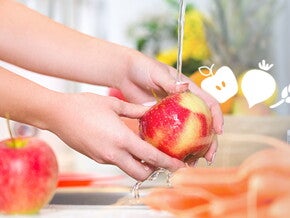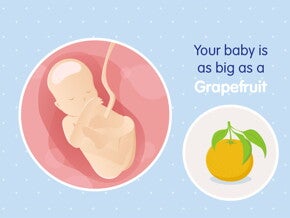
A new era in eating
Now that your little one is officially a toddler, mealtimes are a whole new exciting experience—for him and you. Not only is he taking control of his spoon now, he might also be telling you what he wants to eat. And while there might be a bit of mess in the beginning, it’s all part of the fun. You can look forward to enjoying family meals together—a time to connect and catch up, with everyone enjoying the same dishes. As he masters his self-feeding skills, it’s more important than ever to offer your toddler a variety of nutritious foods, and let him decide if, and how much, he wants to eat.
The birthday cake dilemma
At his recent first birthday, did you struggle with the decision as to whether to let your baby eat cake for the first time? Special occasion foods, such as birthday cake, only appear on the table for celebrations. As long as you respected his cues—allowing a taste, without any pressure, you can feel comfortable that you followed the principles of responsive feeding. The key is to emphasize the link between specific foods and family events.
Research in older children shows that the more parents say a food is never allowed, the more likely the children will overindulge in it when given the chance. What’s more, restricting food makes it harder for your toddler to recognize his own hunger and fullness signs, and can lead to him becoming overweight when he’s older.
Set a good example and he’ll gradually start eating the same healthy meals that you enjoy—and if you feel improvements could be made in your own diet, now is the time to make them. Remember that your toddler-age child will look to you for examples. If you end each meal with a sweet treat or dessert, he will likely want the same too. Follow our checklist below and let him explore his tastebuds for himself.
- Cut up soft foods so they’re easy to eat
By now, your toddler will have practiced eating different textures and he may even have several teeth. Remember, he’s still learning how to chew and swallow. Be sure to cut up his food into small, bite-sized pieces. These should be no larger than 1.5cm (1/2 inch) to enable him to pick up what he chooses and easily gum or chew it.
- Keep offering a variety of healthy foods
Sometimes toddlers need to try a new food up to eight times before they decide they like it, so don’t give up! A recent study showed that toddlers who had tried more fruits and vegetables at 14 months old, enjoyed a wider range of fruits and vegetables between three and four years of age. Continue to offer a variety of healthy foods and let him explore—with all his senses—new colors, textures, and flavors when he’s ready. He’ll decide what and how much he wants to eat.
- Hold the salt and sugar
Don’t worry if you think your toddler’s food tastes plain—he doesn’t need the added salt or sugar that you may have become accustomed to, and introducing these at a young age means he may develop a taste for them as he grows up. You can always add a little flavor with herbs or spices. Set aside a portion of the family meal for your little one first, before adding any extra salt or sugar to the rest of the family’s meal—or treat this as an opportunity for you all to cut down.
- Watch that he doesn’t overfill his mouth
Now that he’s feeding himself, keep a close eye on your toddler to make sure he’s not packing too much into his mouth at one time. Offer just a few finger foods or diced pieces at a time, which can break up easily in his mouth. Check to see that he’s finished them before you offer any more.
- Make sure he’s seated, supervised, and safe
Sitting at the table during mealtimes not only lets your toddler enjoy this special family time together, it may also mean he has a healthier diet and better eating habits when he’s older. Strap him into his highchair, and pull it up to the family table. Never leave him unattended. Serve all meals—including snacks—at the table. Do the same thing when you are out and about.
- Avoid choking risks
As he becomes more confident in his independent eating, be even more mindful of choking risks. Avoid offering large chunks of any kind of food, and watch out for things that are round, hard, sticky, small, or chewy. Whole nuts, seeds, and popcorn, are off the menu. Carrots and green beans must be cooked and diced, grapes and cherry tomatoes quartered, sausages cut up lengthwise and sliced, and nut butters spread thinly on bread, before serving to your toddler.
- Don’t give favorites as rewards
Avoid offering his favorite foods in an attempt to get him to eat something, or as a reward for trying something he doesn’t like. This may only reinforce his lack of interest in new foods, and makes him less likely to develop a taste for them.
- Offer water in a cup
There’s no room in your toddler’s little tummy for empty calories from sugar-sweetened beverages. Offer water or milk (breast milk, whole cow’s milk, or growing-up milk) in a cup at every meal and snack time.
Keep on track
With such an array of new foods to offer, it may be difficult sometimes to keep up with what your toddler is eating over the course of a week. Print out our handy Food Tracker, stick it on your fridge, and fill it out every day to see if your little one is eating from each of the five food groups, giving him the nutrients he needs to grow big and strong for more adventures.

What patterns did you notice in your toddler's diet? Does he eat foods from each of the food groups on the days you checked? What, if any, food groups does your little one seem to be missing?
Sources
|
Dattilo AM Programming long-term health: Effect of parent feeding approaches on long-term diet and eating patterns. In: Early nutrition and long-term health, mechanisms, consequences and opportunities. Ed., Saavedra and Dattilo, Elsevier, 2017: 471-95.
Mallan KM, Fildes A, Magarey AM, et al. The relationship between number of fruits, vegetables, and noncore foods tried at age 14 months and food preferences, dietary intake patterns, fussy eating behavior, and weight status at age 3.7 years. J Acad Nutr Diet 2016; 116(4):630-7.
Shelov SP & Altmann TR (Eds.). (2009). American Academy of Pediatrics. The complete and authoritative guide Caring for your baby and young child birth to age 5 (5th ed.). USA: Bantam Books.
https://www.healthychildren.org/English/health-issues/injuries-emergenc… (Accessed August 8 2018)


















